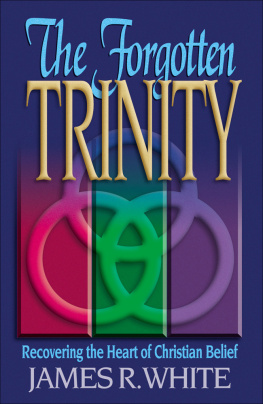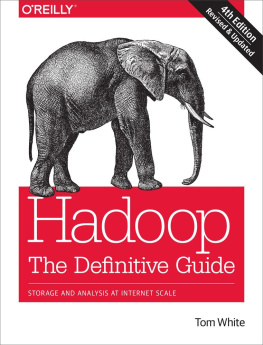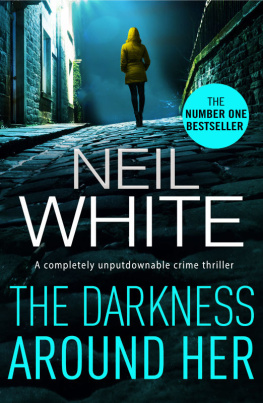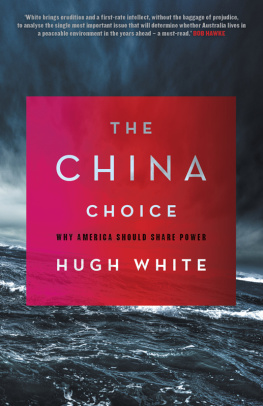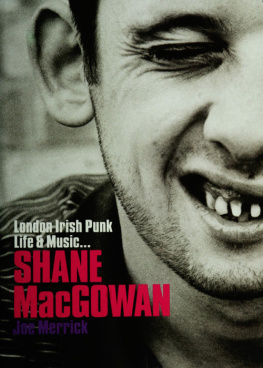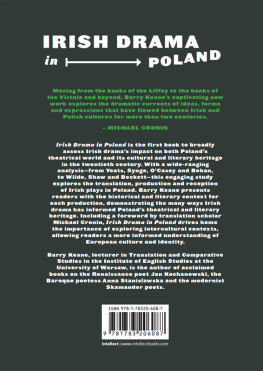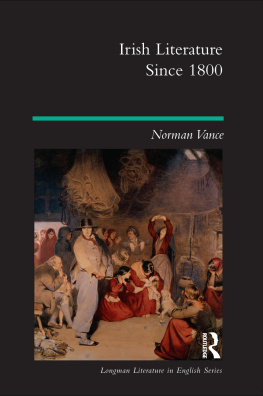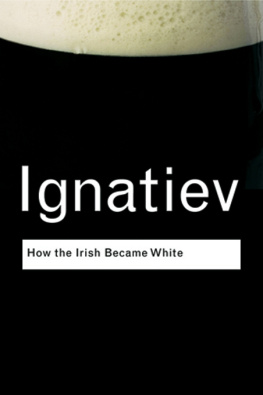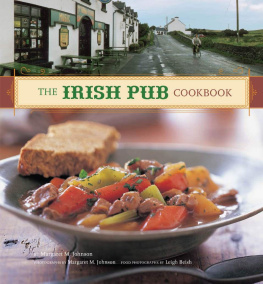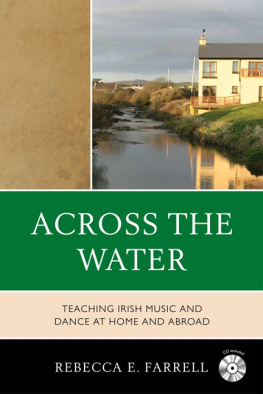White - Music and the Irish Literary Imagination
Here you can read online White - Music and the Irish Literary Imagination full text of the book (entire story) in english for free. Download pdf and epub, get meaning, cover and reviews about this ebook. City: Ierland;Oxford etc, year: 2009;2008, publisher: Oxford University Press, genre: Art. Description of the work, (preface) as well as reviews are available. Best literature library LitArk.com created for fans of good reading and offers a wide selection of genres:
Romance novel
Science fiction
Adventure
Detective
Science
History
Home and family
Prose
Art
Politics
Computer
Non-fiction
Religion
Business
Children
Humor
Choose a favorite category and find really read worthwhile books. Enjoy immersion in the world of imagination, feel the emotions of the characters or learn something new for yourself, make an fascinating discovery.

Music and the Irish Literary Imagination: summary, description and annotation
We offer to read an annotation, description, summary or preface (depends on what the author of the book "Music and the Irish Literary Imagination" wrote himself). If you haven't found the necessary information about the book — write in the comments, we will try to find it.
White: author's other books
Who wrote Music and the Irish Literary Imagination? Find out the surname, the name of the author of the book and a list of all author's works by series.
Music and the Irish Literary Imagination — read online for free the complete book (whole text) full work
Below is the text of the book, divided by pages. System saving the place of the last page read, allows you to conveniently read the book "Music and the Irish Literary Imagination" online for free, without having to search again every time where you left off. Put a bookmark, and you can go to the page where you finished reading at any time.
Font size:
Interval:
Bookmark:
MUSIC AND THE IRISH LITERARY IMAGINATION
HARRY WHITE


Great Clarendon Street, Oxford OX2 6DP
Oxford University Press is a department of the University of Oxford.
It furthers the Universitys objective of excellence in research, scholarship,
and education by publishing worldwide in
Oxford New York
Auckland Cape Town Dar es Salaam Hong Kong Karachi
Kuala Lumpur Madrid Melbourne Mexico City Nairobi
New Delhi Shanghai Taipei Toronto
With offices in
Argentina Austria Brazil Chile Czech Republic France Greece
Guatemala Hungary Italy Japan Poland Portugal Singapore
South Korea Switzerland Thailand Turkey Ukraine Vietnam
Oxford is a registered trade mark of Oxford University Press
in the UK and in certain other countries
Published in the United States
by Oxford University Press Inc., New York
Harry White 2008
extracts from the works of James Joyce the Estate of James Joyce
The moral rights of the author have been asserted
Database right Oxford University Press (maker)
First published 2008
All rights reserved. No part of this publication may be reproduced,
stored in a retrieval system, or transmitted, in any form or by any means,
without the prior permission in writing of Oxford University Press,
or as expressly permitted by law, or under terms agreed with the appropriate
reprographics rights organization. Enquiries concerning reproduction
outside the scope of the above should be sent to the Rights Department,
Oxford University Press, at the address above
You must not circulate this book in any other binding or cover
and you must impose the same condition on any acquirer
British Library Cataloguing in Publication Data
Data available
Library of Congress Cataloging in Publication Data
White, Harry.
Music and the Irish Literary Imagination/Harry White.
p. cm.
Includes bibliographical references and index.
ISBN 9780199547326
1. English literatureIrish authorsHistory and criticism. 2. English literatureIrish authorsMusical
settingsHistory and criticism. 3. English literature19th centuryHistory and criticism.
4. English literature20th centuryHistory and criticism. 5. Music and literatureHistory19th
century. 6. Music and literatureHistory20th century. 7. MusicIreland19th century
History and criticism. 8. MusicIreland20th centuryHistory and criticism. I. Title.
PR8722.M85W45 2008
820.935780899162dc22
2008036149
Typeset by SPI Publisher Services, Pondicherry, India
Printed in Great Britain
on acid-free paper by
Biddles Ltd., Kings Lynn, Norfolk
ISBN 9780199547326
1 3 5 7 9 10 8 6 4 2
For Brian Friel
In 1994 the Irish poet Eavan Boland published a shrewd and affectionate memoir of her friendship with Derek Mahon, which began in April 1964. Thirty years later Boland could recall that their reactions to the early years of the Northern Irish crisis were very different: Mahon was trapped in the emerging debate on the obligations of Irish poetry at a time of political and social collapse simply by being a Northerner. For Boland herself, things were otherwise: As a woman poet, I had the opposite experience. I found myself without a discourse.
Such marks of identity (northerner, woman poet) indicate modes of inclusion and exclusion which still prevail in the discourse about Irish writing, and as a musicologist I feel acutely aware of them both. To be oppressed by the bright, imperious music (Mahon) of a poetic tradition, or to find oneself without a discourse, are predicaments which have a strangely familiar ring about them, at least to me. That is one reason why this book is preoccupied by the inclusion and exclusion of music as a formative agent in Irish writing from 1800 to the present day. But this preoccupation would not count for much were it not for the discovery that it originates and endures in the Irish literary imagination itself, notwithstanding its frequent (and general) absence from the aftermath of critical commentary. Given this discoveryas I hope to show here the musical discourse which pervades Irish writing becomes more difficult to overlook, if only because its striking presence redeems the long absence of musical works from Irish cultural history, to the extent that Irish poetry, drama, and fiction have functioned as objective correlatives of musical genres which originated elsewhere. Certain Irish writers are explicit on this point (Bernard Shaw and James Joyce are good examples), but the discourse itself deserves an exposition and a history.
It is a discourse of musical beginnings and verbal endings. This progression obtains with such frequency (particularly in Moore, Synge, Shaw, and Joyce), that one could be forgiven for mistaking the part for the whole: an immersion in music and the serious consideration of music as a profession are preliminaries which inform the work of such writers, but the presence of music and the absorption of musical genres in their work are not exhausted by these vital overtures. On the contrary: it is often a determination to represent the poem, the play, or the novel as an imperative expression or outgrowth of musical thought that animates the imagination and accounts for the rehabilitation of musical forms in Irish writing.
But the abiding presence of musical thought also attains to a discourse of symbolic projection, dispossession, and repossession which is variously (if unmistakably) related to the presence and absence of the Irish language in the work of Irish writers. This apposition between language and music (as in Yeatss declaration of the supreme theme of art and song) is underwritten by the retrieval and reception of Gaelic cultural history in the late nineteenth century, not least by Yeats himself. In that retrieval, music and language are idealized to the point where they are synonymous. In such a projection, music itself acquires a radical symbolic importance (specifically with regard to the poetic imagination), partly because it cannot otherwise be distinguished from the literary works which it inspires, except by casual reference to folk song. But decades before Yeats had written a line, Thomas Moore would realize (with spectacular success) the arch-romantic project of translating Irish music into English verse. In that enterprise, Moore established a conventional understanding of music in relation to literature that would abide long after Irish writers had embraced the European musical artwork in preference to traditional Irish music. If this book does nothing else, I hope it will help to identify Moores achievement as an inherent presence in Irish writing precisely on this account, in addition to his remarkable influence (likewise often eclipsed) on the development of French and German musical romanticism.
Moores impact on Berlioz and Schumann, decisive though it was, would not be sufficient to justify the comparison I have tendered in this book as between the canonic sovereignty of European art music in the nineteenth century and the no-less striking (and formative) influence of Irish writing in the twentieth. But the abiding presence of European music in Irish literature is another matter, and it is this presence which has allowed me to relate one tradition to the other, especially in regard to Becketts subversion of Joyce, and Friels recovery of tonal music (after Beckett) as a fundamental narrative of extra-musical meaning. I have found it illuminating to read Becketts work in relation to Joyce, specifically through the agency of a musical likening, as between Arnold Schoenbergs heroic modernism and the scrupulous reductionism of Anton Webern. But I have also advanced Friels reception of nineteenth-century music, not as a repudiation of Beckett, but more instructively as a means of pressing home the operatic condition of Irish dramaturgy which Synge and Shaw both promote. In this respect, the readings of Synge and Shaw offered in this book are only completed in the chapter on Friel. With regard to Friels own plays, I have also argued that they repossess the European musical work to the extent that it becomes essential (rather than peripheral) to a dramatization of Irish experience. When Chopin and Mendelssohn thus preoccupy the literary imagination, the presence of music is actual as well as symbolic.
Next pageFont size:
Interval:
Bookmark:
Similar books «Music and the Irish Literary Imagination»
Look at similar books to Music and the Irish Literary Imagination. We have selected literature similar in name and meaning in the hope of providing readers with more options to find new, interesting, not yet read works.
Discussion, reviews of the book Music and the Irish Literary Imagination and just readers' own opinions. Leave your comments, write what you think about the work, its meaning or the main characters. Specify what exactly you liked and what you didn't like, and why you think so.

